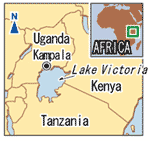(3)Junior high school students learn the benefits and dangers of science.by Tomonori Oshita
Gyebale!
In Uganda, this means "Good job!". As a member of the Japan Overseas Cooperation Volunteers (JOCV), I teach math and physics to junior high school students in the countryside of Uganda in East Africa. Since I was born in Hiroshima, I wanted to organize an activity related to the atomic bomb during my stay here.
On August 6, 2006, the memorial day of the bombing, I held a "Science Fair" that brought together about 300 students at a local school. I shared the destruction of Hiroshima after the bomb was dropped to teach that science can have a negative, as well as a positive, impact on our lives. I believe it was a good opportunity for them to reflect on using science wisely.

Students listening to a book about Hiroshima
Tomonori Oshita
He was born in Hiroshima. After graduating from university, he worked at a company and then, in December 2005, he joined the JOCV as a science and math teacher in Uganda.
With the help of my co-workers and other members of the JOCV, the students and I did six experiments using a hot-air balloon and a plastic bottle rocket. The students seemed to enjoy these experiments and I explained about the idea of nuclear fission so they could understand the connection between science and the bombing of Hiroshima. In Uganda, students study atomic power and nuclear fission early in their studies, so it was a timely topic.
I explained that this technology was used to make the atomic bomb that destroyed Hiroshima and I shared visual aids of the damage and after-effects. Using a rope, I also showed the size of the bomb to help students imagine it more clearly. When I stressed that an atomic bomb kills indiscriminately, the students found this fact very disturbing.

Uranium, which can be used to make nuclear weapons, was recently discovered in Uganda. How should it be used? I asked them, "Will you risk repeating the tragedies of Hiroshima and Nagasaki by adding to the more than 27,000 nuclear warheads already in this world?" They may face this issue in the near future and I wanted them to contemplate it.
A nineteen-year-old student remarked, "Hiroshima was destroyed by the same science we're now learning."
Human civilization could not have developed without science and it's natural that the Ugandan government stresses technology to promote economic growth. At the same time, since these students will impact the future of their country, it's important to teach them all aspects of science.
- Japan Overseas Cooperation Volunteers (JOCV)
Organized by JICA, JOCV is a program in which Japanese volunteers, age 20-39, share their skills in developing countries. Working in about 70 countries in jobs related to education or public health, a total of 28,000 people have participated in this program.